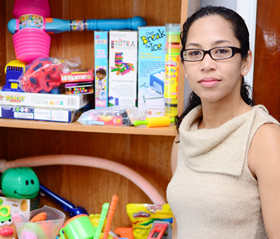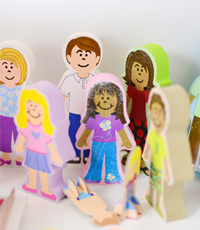It was the lure of the environment that encouraged Nicolette Choo Quan, in late 2013, to move her practice from Mucurapo Road in Port of Spain to its new location at Hibiscus Place in Petit Valley — where it now shares a location with the Adult Day Centre for Seniors and the WOW gym for mature women.
Although their various lines of work may not be closely interlaced, it is a refreshing change to be among health and wellness-minded professionals in an environment that does not feel clinical or forced.
Toys help when there is a communication barrierThis is crucial for her patients, many of whom are young children — which explains the sandbox and the colourful variety of toys that occupy one side of her office.
“Play therapy,” she explains. “Toys help when there is a communication barrier — sometimes the child is too young to talk, is unwilling to talk, or may not even speak the language… but through these toys, they can act out a scene of trauma they have experienced — abuse, a fire, or witnessing a murder.”
The Expressive Arts
Play therapy is one of the treatments in which Nicolette is currently training, among a wide variety of therapy forms on her long list of accomplishments and the even longer ‘to-do’ list in her mind.
Working with at-risk children and youth
For over two years she was the Centre Coordinator and Counsellor at the “Shalom Centre” special project at the St. Dominic’s Children’s Home, working with at-risk children and youth.
She has also worked with the St. James Police Youth Club continuing her work with at-risk youth and with CREDI (Catholic Religious Education Development Institute) providing practicum supervision for their students. She is also certified by Boys Town USA to teach Common Sense Parenting.
Ironically, becoming a mental health therapist was not her original plan.
“I started off doing engineering,” Nicolette admits. “But I always knew I wanted to do something different: something with people, something to help. I pulled myself out of the program and changed to Psychology with the intention of working with expressive arts — play, dance, poetry, dream analysis, art therapy, just about anything beyond the typical talk therapy.”
BE YOU Mental Health Services

In 2012, she joined forces with co-worker Margaret Johnston at the St. Dominic’s Children’s Home to form BE YOU, a group providing a range of mental healthcare services tailored to children and families, including:
- Workshops
- Seminars
- Training
- Individual & Group Counselling
- Trauma Counselling
- Play Therapy
“We also do coaching for teachers — what signs to look for, what resources there are, understanding the differences between a psychologist and psychiatrist, or sometimes a medical professional may be needed,” she adds. “We forget sometimes that teachers can be traumatised too, and not know where to turn. So we show them resources to help both themselves and the children.”
Teachers can be traumatised tooShe points out that although as a country we do have systems in place to deal with crisis situations in schools, most of it is ‘after the fact’, when there is so much that could be done to prevent such instances from happening in the first place.
“Kids are scared, there are things going on around them that they feel they can’t control, and they may act out and cause something, or retreat and that has its own effects,” she says. “We can’t just say ‘don’t worry, everything is alright’; we have to empower them to be more resilient in this environment.”
The stigma of Mental Health
Stigmatised for seeking professional helpShe hopes that, through her various lines of work including BE YOU and her own private clients, she can positively influence the perception of Psychology in Trinidad and Tobago. While the field is respected as a medical profession, in social circles persons may be stigmatised for seeking professional help.
Beyond that stigma, she notes that in the field of mental health, misdiagnosis can take place and cause severe repercussions.
“There are always going to be updated versions of research, and of course the criteria we are working with is based on research conducted in other countries, whereas in the Caribbean we ‘peak’ higher in some things than what may be standard variables in the research,” she explains.
Be careful with labels“We also have to be careful with labels — what school does a child with ADHD (Attention Deficit Hyperactivity Disorder), or a manic-depressive or bipolar child, go to? Evaluation is key, yes, but there needs to be an end game: if you pigeon-hole children, you limit them.”
The Power of Expression
Even when the ‘label’ does fit, labels are harmful in themselves.
The extrinsic can become intrinsic
“Children can internalise labels — if they are told they are something, they can become it… the extrinsic can become intrinsic,” she adds. “Before we put a label on a child, it is always better to see what can be done. What my line of work is, involves finding a way that works for my client — a way to express himself or herself.”
That said, she is a staunch fan of the Free Speech Project that has recently gained significant traction on the radio and in social media. This is one of the positive local avenues for expression, for people from all backgrounds to raise their voices.
“I’ve seen so many young people who are so deep; so many at-risk youths, who are so talented,” she says. “Musically, artistically, creatively — once you open it up, and they find a tool to express themselves… once you pull out that side of them, you can make such a difference.”

